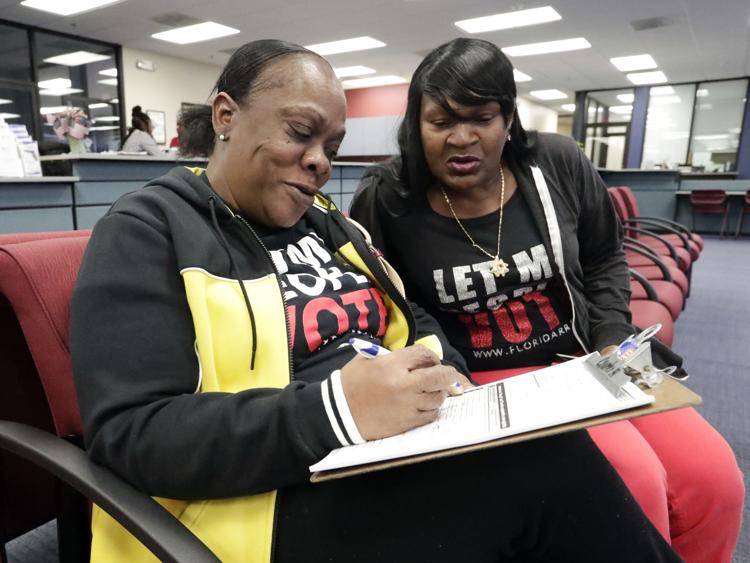State: Floridians agreed ‘financial obligations’ must be paid before felons can vote

Former felon Yolanda Wilcox (left) fills out a voter registration form as her best friend, Gale Buswell, looks on at the Supervisor of Elections office Tuesday, Jan. 8, 2019, in Orlando, Fla.
(The Center Square) – A 2019 Florida law requiring “legal financial obligations” be resolved before felons’ voting rights are restored is exactly what voters approved when they passed Amendment 4 in 2018, attorneys for the state argued in a brief filed in the U.S. 11th Circuit Court of Appeals.
Attorneys representing Gov. Ron DeSantis filed the 88-page brief this week in anticipation of arguments Aug. 18 in their appeal of U.S. District Judge Robert Hinkle’s decision in May that declared Senate Bill 7066 an unconstitutional “pay-to-vote system.”
In granting Florida’s request for an appeal hearing last month, an 11th circuit three-judge panel also agreed to stay Hinkle’s October injunction that prevented the state from blocking felons from voting while the case is being deliberated – denying 80,000 from voting in the Aug. 18 primary – and for the appeal to be heard “en blanc,” or before the court’s full 10-judge bench.
Since that bench now includes two DeSantis-appointed former Florida Supreme Court justices who participated in an advisory hearing on the case, all 10 Democrats on the U.S. Senate’s Judiciary Committee on Tuesday questioned why they, and a former Alabama Supreme Court justice, have not recused themselves.
Judges Barbara Lagoa and Robert Luck, appointed by DeSantis to the Florida Supreme Court in January 2019 and to the 11th Circuit by President Donald Trump in January, and Andrew Brasher, have received letters demanding they explain their involvement in the case.
Nearly 65 percent of Florida voters in November 2018 approved Amendment 4, which restored voting rights for felons, excluding those convicted of murder and sexual assault, after “completing sentences.”
During the 2019 legislative session, the Legislature adopted SB 7066 as “enabling legislation,” which interpreted “completing sentences” to mean paying all legal obligations, including court fees, fines and restitution.
SB 7066 was challenged by an array of groups, including the Brennan Center For Justice, the American Civil Liberties Union, the Campaign Legal Center and the Southern Poverty Law Center, launching a year-long federal legal battle that culminated in an eight-day trial in May in Hinkle’s Tallahassee courtroom.
In his May 24 decision, Hinkle called SB 7066 a “pay-to-vote system” that imposes “a tax by any other name” and required the state ascertain how much a felon owed within 21 days of a status request or voting rights were automatically restored.
In February, a three-judge 11th Circuit panel unanimously upheld Hinkle’s October ruling that SB 7066 denied voting rights of felons “genuinely unable” to pay court costs and retained his injunction that prevented the state from barring 17 plaintiffs from voting.
Hinkle later granted class certification for one consolidated case, Jones v. DeSantis, meaning the ultimate ruling would apply to all of Florida’s 1.4 million potentially eligible felons, of which an estimated 774,000 were projected to register and vote in November. More than 80,000 had done so by June, according to the Florida Division of Elections (DOE).
In their Monday brief, state attorneys argued Hinkle’s ruling “effectively vetoes the judgment of Florida voters that felons must repay their debt to society in full before returning to the electorate” and opponents are attempting to pull “a grievous bait-and-switch.”
States constitutionally are allowed to ban felons from voting permanently “as part of the punishment for their crimes,” and Florida is not required to re-enfranchise felons, the brief maintained.
“It therefore follows that Florida had broad leeway in exercising its discretion whether and on what terms to re-enfranchise felons,” state attorneys wrote, adding Amendment 4 “provides an avenue for automatic restoration of felon voting rights in Florida, therefore opening a way for felons to regain the franchise that previously did not exist.”

